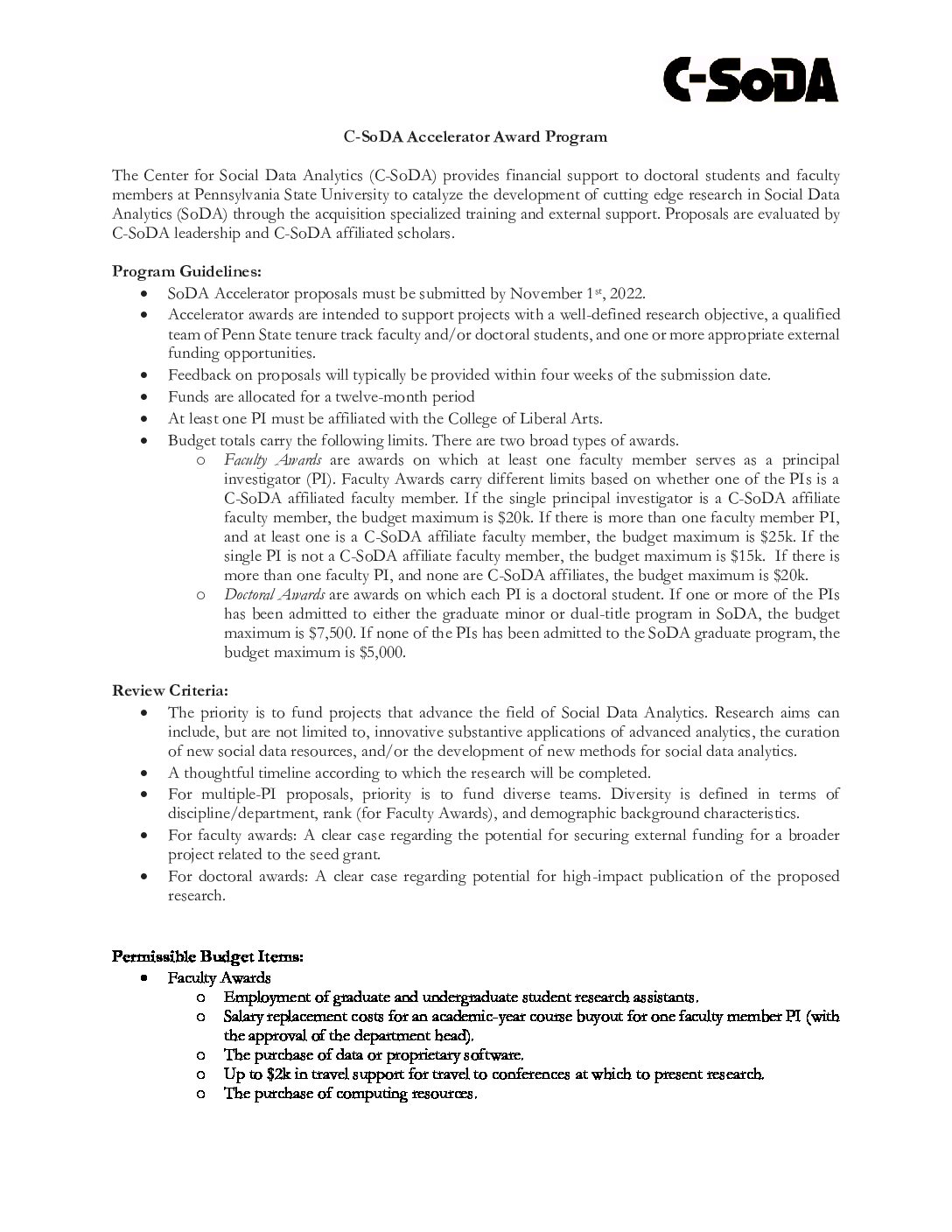C-SoDA Accelerator Award Seed Grant Open for Applications
The C-SoDA Accelerator Award Seed Grant is open for applications. Please see the attached guidelines and instructions for applying. The deadline to submit your application is November 1, 2022.
C-SoDA Accelerator Award Program
The Center for Social Data Analytics (C-SoDA) provides financial support to doctoral students and faculty members at Pennsylvania State University to catalyze the development of cutting edge research in Social Data
Analytics (SoDA) through the acquisition specialized training and external support. Proposals are evaluated by C-SoDA leadership and C-SoDA affiliated scholars.
Program Guidelines:
• SoDA Accelerator proposals must be submitted by November 1st, 2022.
• Accelerator awards are intended to support projects with a well-defined research objective, a qualified
team of Penn State tenure track faculty and/or doctoral students, and one or more appropriate external
funding opportunities.
• Feedback on proposals will typically be provided within four weeks of the submission date.
• Funds are allocated for a twelve-month period
• At least one PI must be affiliated with the College of the Liberal Arts.
• Budget totals carry the following limits. There are two broad types of awards.
- Faculty Awards are awards on which at least one faculty member serves as a principal
investigator (PI). Faculty Awards carry different limits based on whether one of the PIs is a
C-SoDA affiliated faculty member. If the single principal investigator is a C-SoDA affiliate
faculty member, the budget maximum is $20k. If there is more than one faculty member PI,
and at least one is a C-SoDA affiliate faculty member, the budget maximum is $25k. If the
single PI is not a C-SoDA affiliate faculty member, the budget maximum is $15k. If there is
more than one faculty PI, and none are C-SoDA affiliates, the budget maximum is $20k.
- Doctoral Awards are awards on which each PI is a doctoral student. If one or more of the PIs
has been admitted to either the graduate minor or dual-title program in SoDA, the budget
maximum is $7,500. If none of the PIs has been admitted to the SoDA graduate program, the
budget maximum is $5,000.
Review Criteria:
• The priority is to fund projects that advance the field of Social Data Analytics. Research aims can
include, but are not limited to, innovative substantive applications of advanced analytics, the curation
of new social data resources, and/or the development of new methods for social data analytics.
• A thoughtful timeline according to which the research will be completed.
• For multiple-PI proposals, priority is to fund diverse teams. Diversity is defined in terms of
discipline/department, rank (for Faculty Awards), and demographic background characteristics.
• For faculty awards: A clear case regarding the potential for securing external funding for a broader
project related to the seed grant.
• For doctoral awards: A clear case regarding potential for high-impact publication of the proposed
research.
Permissible Budget Items:
• Faculty Awards
o Employment of graduate and undergraduate student research assistants.
o Salary replacement costs for an academic-year course buyout for one faculty member PI (with
the approval of the department head).
o The purchase of data or proprietary software.
o Up to $2k in travel support for travel to conferences at which to present research.
o The purchase of computing resources.
• Doctoral Awards
o Employment of undergraduate student research assistants.
o The purchase of data or proprietary software.
o The purchase of computing resources.
o Support for participation in training programs associated with data access, data management,
and research methods.
o Travel support for travel to conferences at which to present research.
o Summer wages.
Proposal Structure and Submission:
• The proposal documents should be submitted to the C-SoDA Director, Bruce Desmarais, at
bdesmarais@psu.edu. If you do not receive confirmation of proposal receipt within 48hrs of
submission, please re-send.
• The proposal document should not exceed five pages (single-spaced, 10pt font).
• The proposal document should include the following components:
o A project description, in which the core research objectives and tasks are identified.
o A project timeline
o An itemized budget justification.
o For faculty awards: A plan for seeking external funding for a broader project related to the
proposal.
o For doctoral awards: A description of the paper that will be submitted for publication, a
timeline for submission, and discussion of suitable high-impact outlets.
• The following documents should accompany each proposal.
o A CV for each PI.
o A brief (1--2 sentence) note of support for each PI. For faculty PIs, letters of support should
come from department heads. For graduate student PIs, letters of support should come from
graduate program directors.
o If the award is to support human subjects research, documentation of IRB submission or
approval.
o Cost and availability documentation for relevant budget items (e.g., the conditions for
accessing a proprietary database, the cost of a software license).
o An official budget, prepared by the PIs grants office using the SIMS budget system.
Award Recipient Obligations:
• For faculty awards: Within 18 months of the Award date, each PI is obligated to report to C-SoDA
staff with a proposal title and prospective funder of a proposal that was submitted based at least in
part on the research supported by the Accelerator Award.
• For doctoral awards: Within 18 months of the Award date, each PI is obligated to report to C-SoDA
a record of the paper that was submitted for publication based on research supported by the
Accelerator Award
• At least one PI on each SoDA Accelerator Award must participate in the annual C-SoDA Research
Roundup, held in January following the award year, and present the research that is in progress.
For questions, please contact: Bruce Desmarais (bdesmarais@psu.edu), Director of the Center for Social
Data Analytics, and Professor in the Department of Political Science.

